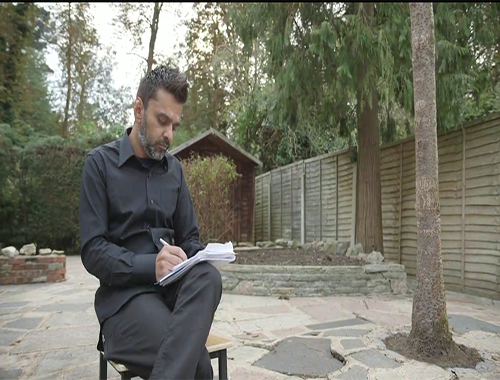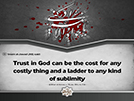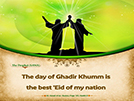A. THE KNOWLEDGE OF AL‑GHAYB
- Details
- Hits: 5562
Chapter 4
The Knowledge of God
--------------------------------------------------------------------------------
A. THE KNOWLEDGE OF AL‑GHAYB
al‑Ghayb means "unseen" or "hidden" things. Ilmu 'l ghayb means knowledge of the things which are hidden at present, like the events of the future. Such knowledge is the sole prerogative of Allah. Nobody can know the ghayb except Allah.
Of course, many of us can forecast hundreds of things which are to happen in future. We know in advance the time and extent of tide; we know the exact day, time and extent of solar and lunar eclipses. Weathermen forecast the rain, storm, cyclone and many such conditions of season and weather. By looking at the feature of a man, some of us can even say with a degree of certainty what is the character and nature of that person. Doctors and physicians can easily gauge the chances of survival of their patients. You may find many such examples in your daily life. Is it same as 'ilmu 'l ghayb? Does the weatherman know the ghayb?
The answer is 'No'. Because all such forecasts and prophecies are based upon the observation of the laws of nature. By keen observation and deduction, we are in a position to know many things in advance. Such advance knowledge is based upon deduction and observation of physical laws.
The 'ilmu 'l‑ghayb which is mentioned in the Qur'an as the sole prerogative of Allah, is the knowlege of the unseen things and future events which is not based on deduction or observation of physical laws: It is this type of knowledge which has been referred to in the following verse:
(Allah is) the Knower of the unseen, and nor does He reveal His secrets to any one, except the one whom He chooses from among the messengers; for verily He causes a guard to march before him and after him. (72:26‑27)
This verse and many similar verses declare in unambiguous terms that the knowledge of unseen things and future events, not based on observation of physical laws or deduction, is with God only. And He, in His own wisdom, selects some messengers, prophets and Imams to divulge to them such knowledge as and when He thinks fit. In short, nobody can know the unseen things or future events (without some present signs or deductions) except Allah. And Allah, in His grace, informs whoever He selects for such knowledge, be they angels, prophets or Imams.
In the sayings of the Imams of Ahlu'l‑bayt, it has been explained that Allah had revealed only one of His Great Names to 'Asif bin Barkhiya (the vizier of Prophet Sulayman); and by that one part of the knowledge he was able to bring the throne of Bilqis, the Queen of Sheba, from her capital to Jerusalem within any eye‑wink. [1]
But Allah had given our Holy Prophet (upon him and his progeny be peace) all the knowledge given to all the prophets from Adam onwards (upon them be peace), as well as the knowledge given to all the angels; and then his knowledge was being increased constantly. And he, by divine order, taught all that to 'Ali (upon him be peace); and that knowledge passing through the succeeding Imams has come to Imam al‑Mahdi (upon all of them be peace). [2] That is why they have been called 'the Treasurers of Allah's knowledge. [3]
1. "Lawh mah fuz" and "Lawh mahw wa ithbat"
Lawh means "tablet of wood or stone used for writing". Metaphorically, it is used for "knowledge," because knowledge usually comes from written things. Mahfuz means secure; in safe keeping; something that cannot be apprehended by unauthorised persons; firmly protected. Therefore, "lawh mahfuz" means the knowledge which cannot be apprehended by others; the knowledge which is firmly protected.
Mahw means erasure; rubbing something out. Ithbat means affirmation; writing. Therefore, "lawh mahw wa ithbat" means the knowledge which is capable of erasure and substitution; the knowledge which is liable to change from time to time.
Now that you know the literal meanings of "lawh mahfuz" and "lahw mahw wa ithbat," let me explain what is meant by these two terms in Islam.
We know that the knowledge of God can never be wrong. In other words, there can never be any change in the knowlege of God. It is for this reason that God has called His own knowledge as "lahw mahfuz". This phrase describes the knowledge of Allah because His knowledge can never change. It is always correct and needs no erasure or substitution or modification.
"Ummu 'l‑kitab" is another name used for the knowlege of Allah. It means "the basic book," "the mother of the book." Allah's knowledge is called "the basic book;"that is, the basic knowledge; or "the mother of the book," that is, the source of knowledge because only His knowledge can be called "the true knowledge".
"Lawh mahw wa ithbat" is the name given by God to the knowledge of the angels, prophets and Imams. Their knowledge, though the most complete and perfect of all human beings, is still incomplete when compared to the knowledge of God.
These names have been taken from the following verse of the Qur'an:
For every term there is a book prescribed; Allah erases out whatever He pleases and writes (whatever He pleases); and with Him is the mother of the book.(13:39)
This 'mother of the book' is called "lawh mahfuz" in the following verse:
Nay, it is the glorious Qur'an, in the guarded tablet. (85:22)
As the knowledge of the angels, prophets and Imams is constantly being replenished, perfected and completed, it is called 'the tablet of erasure and writing ‑ lawh mahw wa ithbat.. [4]
More will be said about lawh mahw wa ithbat in the following section.











